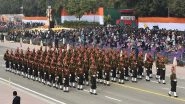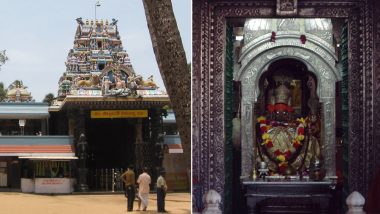While Indians boast of being a multi-religious country, nobody clearly looks into some religious traditions and rituals which are rather restricting. It is the 22nd century and unfortunately, some members of the Indian population are still seeking equality even when it comes to offering prayers. A recent example is of the Sabarimala temple In Kerala, where women in the age group of 10-50 years are not allowed to pray. But years of batting for gender equality, women have today won their right to pray.
While it is a celebratory win for the women of Kerala today, ideally everyone has to be equal before God. Sabarimala may have been restricting entry of women in the temple, but in Kerala itself, there are some temples which do not allow men to enter too. There are quite a few places in India, where men aren't allowed to enter. Sabarimala Verdict by Supreme Court Highlights: 'Women are Worshipped like Goddesses, Temple Doors Cannot be Closed For Them'.
Temples Where Men Are Not Allowed To Enter
Attukal Temple, Kerala
The women are dominant worshippers in the Attukal Bhagavathy Temple in Trivandrum in Kerala. Goddess Bhadrakali is the main deity here, often referred to as Kannaki. This temple draws about millions of women on the day of Pongal every year. The temple even holds a Guinness Book of World Records for being the largest single gathering on women for any religious activity.
Chakkulathukavu Temple, Kerala
Dedicated to Goddess Durga, the Chakkulathu Kavu is located in the Alappuzha District of Kerala. There is an annual ritual called 'Naari Puja' and on this day male priests wash the feet of women devotees who observe a strict fast for the period of 10 days. Only women are allowed to enter this temple.
Trimbakeshwar Temple, Maharashtra
The famous Jyotirlinga located in Nashik district of Maharashtra is among the first ones to practice gender equality in the issue of offering prayers. Women were not allowed to enter the inner sanctum of the temple till the year 2016 and Bombay HC passed an order disallowing men from entering the sanctum too.
Lord Brahma temple, Rajasthan
The temple of Lord Brahma at Pushkar in Rajasthan does not allow the entry of married men. The temple dates back to the 14th century and is one of the prominent temples in the state. House-holders cannot enter the sanctum to worship the deity. Only sanyasis can offer their puja here.
Bhagvati Maa Temple, Kanyakumari
The Bhagvati Maa temple in Kerala prominently welcomes only women worshippers. The story behind the temple says that Mata Parvati did penance for Lord Shiva in the middle of an ocean. The temple is supposedly built a the same spot and Kanya Maa Bhagvati is worshipped only by women. Males are not allowed here.
Kamrup Kamchhaya Temple, Assam
The Kamrup Kamchhaya Temple located in Guwahati is believed to be the oldest temples of the 51 shakti pithas and there is an interesting mythological legend behind it. The temple is unique because it allows women to enter while they are menstruating. Legend holds that Goddess Sati menstruates during the 3 days of Ashaad and only women can enter in the premises in their menstrual cycle. In fact, female priests and sanyasis can serve the temple. It has the menstrual cloth of Maa Sati which is considered highly auspicious.
Mata Temple in Bihar
A temple from Muzaffarpur in Bihar does not allow men to enter. A male priest too cannot enter the premises, during a particular period. The rules are very strict but allow women on their period. The particular time celebrates the end of goddess' menstruation as an auspicious event.
The temples mentioned above may seem unjust to men but it is time for both the genders to come together and express their right to pray equally. Women have been suffering under the same rules of for several years now and that injustice cannot serve as justice for the men. Thus, there is a need to collectively address the issue of gender equality in the right to pray. We already have too many issues to deal with different on a gender front, and the fundamental right to pray should not come under them. If we believe in God, then we might as well have the equal rights to pray to him.
(The above story first appeared on LatestLY on Sep 28, 2018 11:38 AM IST. For more news and updates on politics, world, sports, entertainment and lifestyle, log on to our website latestly.com).













 Quickly
Quickly


